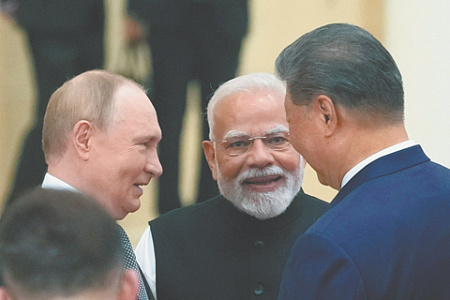
A landmark summit of the Shanghai Cooperation Organisation (SCO) in Tianjin highlighted the bloc’s rising influence as a challenger to the Western-led world order, but also exposed a fundamental rift between its two main architects, China and Russia. While Beijing leveraged the summit to champion economic integration and present itself as a stable global partner, Moscow used the platform for a political offensive against the West, creating a visible divergence in strategy that underscores the complexities of this emerging power axis.
The Tianjin summit, held from August 31 to September 1, was the most representative in the SCO’s history, gathering leaders from over 20 nations, including new members Iran and Belarus, and notable guests like Turkish President Recep Tayyip Erdoğan. China, as the host, focused on a vision of shared prosperity. President Xi Jinping sidestepped direct confrontation with Washington, instead criticizing “hegemony and power politics” while proposing a new SCO development bank and highlighting the $84 billion China has already invested in member states. This economic-first approach is designed to unite nations disgruntled with US dominance, particularly in the wake of trade protectionism.
In stark contrast, Russian President Vladimir Putin concentrated on geopolitical grievances, framing the SCO as the vanguard of “genuine multilateralism.” He dedicated a significant portion of his address to the war in Ukraine, blaming the conflict on a 2014 Western-backed “coup” and NATO expansion. However, despite Putin’s forceful rhetoric and bilateral discussions on the topic, the Ukraine crisis was conspicuously absent from the summit’s final declaration. This omission suggests a broader reluctance among members, including China, to align with Russia’s war, indicating that Beijing’s economic agenda holds greater appeal for the majority.
The summit also cast a spotlight on an increasingly volatile flashpoint: North Korea. Russia’s new mutual defense treaty with Pyongyang, signed in 2024, has already seen North Korean troops reportedly deployed to assist Russian forces in the Kursk region. This deepening military alliance stands in contrast to China’s more cautious position, which continues to call for a peaceful resolution in Ukraine and expresses unease over North Korea’s nuclear ambitions. The differing approaches to Pyongyang reveal a critical limit to the Sino-Russian coordination.
All eyes are now on Beijing, where North Korean leader Kim Jong Un is set to join Xi Jinping and Vladimir Putin for a military parade on September 3. This highly anticipated meeting of the three leaders will be a crucial test for the triangular relationship and could signal the future direction of their collective challenge to the global status quo. While the SCO is growing as a platform for nations seeking an alternative to the West, its internal divisions show that this new bloc is less a monolithic alliance and more a complex coalition united by shared grievances rather than a singular vision for the future.
